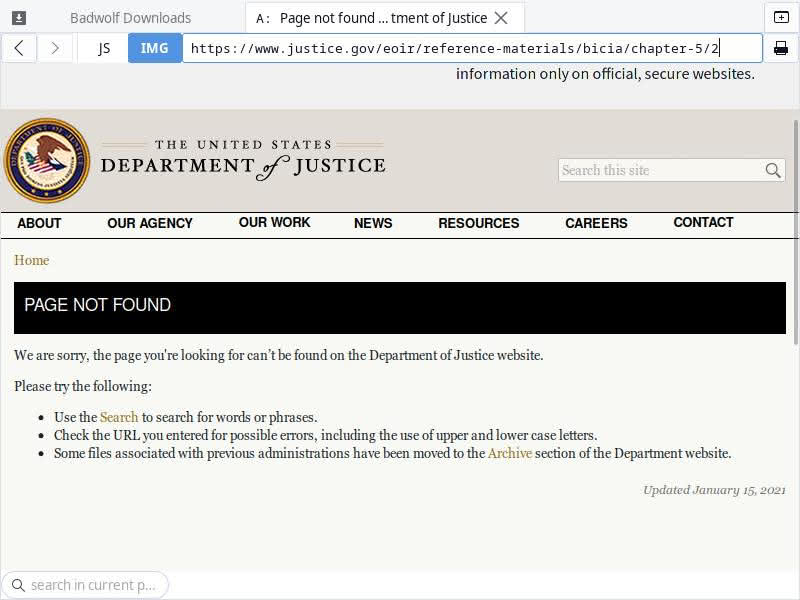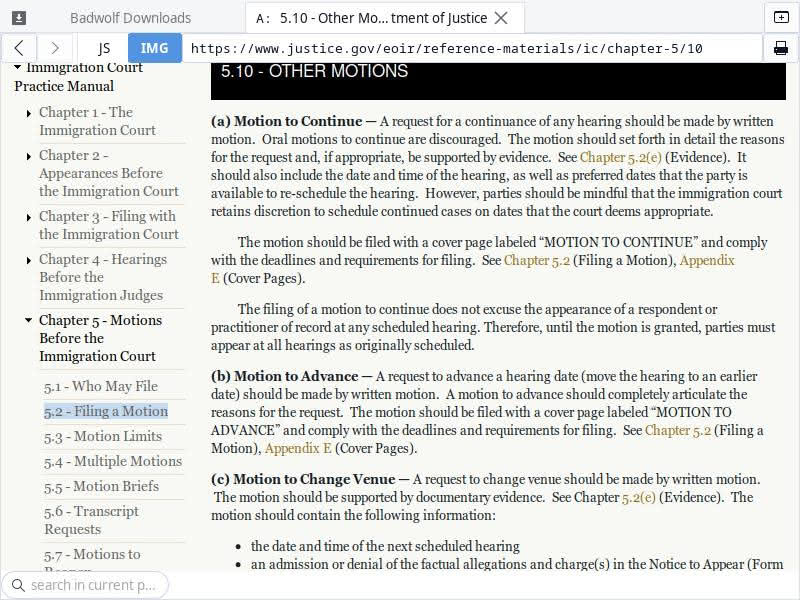Because I am a modest person, it is not often that I write about my little acts of heroism. In fact, the last article that I devoted to the subject was my October 30, 2020 article on my rescuing a fallen public trash can in Gowanus. But there are times when the heroic thing to do is to set aside one’s modesty and report an act of great heroism. In the trash can piece, I quoted someone, who is surely a great authority on the subject:
If you do something heroic but don’t tell every person you know, did you do anything heroic at all?
Someone, somewhere… probably
I am not what the people would describe as “social.” But I do have an audience here at The New Leaf Journal, so I will inspire readers with another story of my heroic deeds.
I was researching motions to advance immigration court hearing dates. I found that there is not much official guidance on the subject. My research brought me to chapter 5.10 of the Immigration Court Practice Manual, which is hosted on the website of the United States Department of Justice. Practice Manual 5.10(b) has the following to say on the subject:
2. Motion to Advance — A request to advance a hearing date (move the hearing to an earlier date) should be made by written motion. A motion to advance should completely articulate the reasons for the request. The motion should be filed with a cover page labeled “MOTION TO ADVANCE” and comply with the deadlines and requirements for filing. See Chapter 5.2 (Filing a Motion), Appendix E (Cover Pages).
In short, a party to a removal proceeding in immigration court can file a motion to have the next hearing held at an earlier date than what is scheduled. But we are less concerned with the law here than with the links. There are two links in 5.10(b):
Both links are supposed to go to other parts of the Practice Manual. The Appendix E link works. However, the chapter 5.2 link – https://www.justice.gov/eoir/reference-materials/bicia/chapter-5/2 – took me nowhere useful:

Fortunately, the broken URL did not impede my research. This is because the left sidebar area contains a full table of contents for the Practice Manual, and one of the items is chapter 5.2 – Filing a Motion.

The sidebar link works. What is the correct URL?
https://www.justice.gov/eoir/reference-materials/ic/chapter-5/2
Compare to broken URL…
https://www.justice.gov/eoir/reference-materials/bicia/chapter-5/2
The correct URL has an ic where the failure URL has bicia. Many less virtuous people would have been content to continue on with their day, having resolved the issue of finding where the link to 5.2 was supposed to go. But I am not like those people. As I demonstrated when I rescued a trash can more than two years ago, I am a hero.
I followed the link to “Contact” on the top bar of the page. After scrolling down, I found a section for Website Feedback with a button to Contact Webmaster. After taking a moment to praise the Department for rejecting Google’s shameful decision to stop using the term Webmaster, I visited the contact page. It contained a simple contact form with fields for name, email address, and message, along with a topic selection drop-down box. Although only the selection box and message fields are required, I filled in all four. Why did I also provide a name and email?
If you do something heroic but don’t tell every person you know, did you do anything heroic at all?
Someone (definitely not me) from some time at some place… maybe
In this case, I used my main New Leaf Journal email. For issues such as this, you need to speak webmaster to webmaster. The first option in the topic selection menu was “Report a broken link or typographical error.” I selected that and then reported my issue, highlighting the affected URL, the section of the affected URL, and where the affected URL was supposed to go.
I received a definitely not automated response within 24 hours. Now normally I would not share this very personal correspondence, but part of the reason I am telling the story is to inspire you, the reader, to be a hero in your own life. What better way to inspire you to engage in acts of heroism than to show you the rewards that accrue to heroes? Behold, the message:
Thank you for your email notifying us of the broken link on the U.S. Department of Justice Web site. Your email has been forwarded to the responsible component within the Department, and the error will be corrected. Thank you again for taking the time to write and let us know about the problem.
Personal email from the Webmaster of the U.S. Department of Justice website to the Webmaster of The New Leaf Journal
Wow. A personal email from the Webmaster of the U.S. Department of Justice. As you can see, it says “thank you hero for your heroism, we recognize you as a hero.”
Incredibly moving stuff.
48 hours have passed and the link is not yet fixed, but I know the Department of Justice Webmaster is on the case. If you read this after the issue is fixed, rest assured that I really did commit an act of heroism, fixing an issue memorialized (by me) on the Internet Archive. If the humble editor of a small online writing magazine can be a hero, you too can be a hero. Let this piece inspire you to do something heroic, like save a friendly fallen trash can, take 2 minutes to send an error report to your friendly government Webmaster, or protect your friend from pedestrian peril.